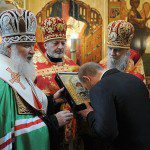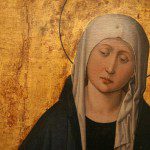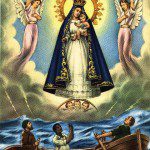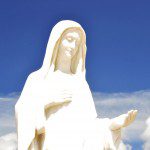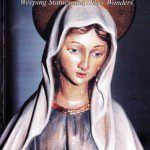By Mystic Post
by Daniel Klimek and Stephen Ryan
“Have I witnessed such intellectual snobbery? I’ve been trampled by it.”
Do miracles really exist? Or is there a logical explanation to the seemingly inexplicable? Investigative Reporter Randall Sullivan, former contributing editor for Rolling Stone and former Oprah Winfrey Televison host, examined how the Catholic Church investigates Holy Visions, miracles and apparitions in his book “Miracle Detectives”.
-

- Photo credit: San Francisco Public Library via Foter.com / CC BY-NC-ND
Mystic Post’s interview with Randall Sullivan
Mystic Post Your book, “The Miracle Detective,” is about the way that the Catholic Church investigates claims of supernatural phenomena and miraculous cures, which led you to research and examine numerous Marian apparition claims throughout Europe and North America. Judging by your previous work, this was new territory for you as a writer. Can you tell us a little more about the book and what led you to write on this subject?
Randall Sullivan:All these years later, I still feel I was led to write “The Miracle Detective.” One inexplicable event after another opened doors I just felt I had to step through. So many unlikely people offered me assistance when I needed it. The whole process became an overwhelming experience of trust. One of the things I had to trust in was that I wasn’t losing my mind. After I returned home from Medjugorje at the end of the summer in 1995, I had no idea how I was going to reconcile what had just happened to me with the life I had been leading, especially on a professional level. I had been a contributing editor at Rolling Stone for more than a decade at that time, and my work for the magazine was a large part of my identity. Suffice it to say, I wasn’t going to get a lot of support for my religious feelings or spiritual experiences at Rolling Stone. Not one of my close friends was a Christian, and the people I worked among in New York and Los Angeles just sort of shook their heads whenever I referred to what was going on with me. Struggling with my situation was a large part of why it took me so long to finish “The Miracle Detective.” I had two other books published during the intervening years, but I always felt as if working on “The Miracle Detective” was the main thing going on with me.
Mystic Post :Your book particularly emphasizes how neuroscience has been used in recent years to test visionary experience, to test mystical phenomena. The French theologian Rene Laurentin has especially led many scientific teams to investigate Marian apparition claims. Can you speak about this, and share with us what scientific technology can tell us about spiritual experience – from your research?
Randall Sullivan: Science can disprove miracles, but it can’t prove them. The most science can do is establish that there is no known explanation for certain phenomena. It can suggest a supernatural cause, but in the end the decision will be a personal matter of faith for everyone who makes it. Mystic Post:The reported Marian apparitions in Medjugorje are featured prominently in your book. Not only did you spend much time in the Bosnian village, but you also stayed with Mirjana Soldo, one of the Medjugorje visionaries, and her family while in Medugorje. Furthermore, from your research, you have written that the “apparitions in Medjugorje have been subjected to perhaps more medical and scientific examination than any other purported supernatural event in the history of the human race.” That’s a profound statement. Will Medjugorje and all the investigations dedicated to it, as a result, be featured prominently on the upcoming show?
Randall Sullivan:Yes. My experiences in Medjugorje figure as a subtext throughout the book and are in the foreground during one of our early episodes, which involves a Marian apparition in Ohio. My first face-to-face meeting with Wayne Weible is sort of a trigger for that. Mystic Post:An unlikely source, U.S. Supreme Court Justice Antonin Scalia, recently referenced Medjugorje in a speech he gave before the St. Thomas More Society and he also mentioned the need to intelligently investigate miraculous claims. Justice Scalia emphasized that the intelligentsia tends to dismiss such things apriori, from miracles to events like Lourdes or Medjugorje, without investigation, as being impossible. Any thoughts on such biases? Plus, have you witnessed any such intellectual snobbery from individuals when researching the book, perhaps even from Church members who no longer believe in the miraculous?
Randall Sullivan:Have I witnessed such intellectual snobbery? I’ve been trampled by it. It remains incredible to me how many so-called intellectuals resort to mindless ideological bigotry when confronted by claims of the miraculous. I think it has to do, ultimately, with the fact that a belief in the miraculous–in the supernatural, for that matter–is rooted in personal experience. People who’ve had that experience know what I’m talking about. People who haven’t are without a clue. And yet we allow the clueless to impose their experiential deficits on the rest of us. It’s one of the more remarkable aspects of modern society that people who scoff at faith–despite being a tiny minority of our population–dominate the cultural apparatus. At least ninety percent of the people in this country believe in God. And yet in the precincts where I’ve spent most of my adult life–academia, the publishing industry and Hollywood–I doubt that the believers number nine percent. Be that as it may, I see myself as trying to reach those people who HAVE had the sort of experience I’m talking about, but have either denied it or fled from it or explained it away. I want to help them to recover and respect what they knew in those sacred moments.
Mystic Post:While your book is very readable for those who have little experience with the subject, it’s also a very intelligent work. Unlike most books, it treats religious and spiritual experience with respect and sophistication. That includes a look at how science is used to test miraculous cures, a look at the relationship between psychology and religion, plus the ideas of eminent thinkers like Swiss psychologist Carl Jung and Albert Einstein on religious experience and God are examined—not to mention a fascinating interview you conducted with Fr. Benedict Groeschel, who himself is a psychologist and a former investigator of supernatural phenomena. There’s a lot that people can learn from this work about the complex and fascinating relationship between science and religion. Do you think that Americans are getting the full picture as to how complex this relationship is when it comes to discussions of science and religion in our media culture, or is the popular view presented too narrow when considering the reality?
Randall Sullivan:Shortly before “The Miracle Detective” hit bookstores, my publisher worried that it was “too smart for religious people and too religious for smart people.” I guess I’ve never accepted that dichotomy. I don’t believe you have to be dumb to be religious. I also think that many people are sorting through their doubts and concerns and questions about how religious feelings and spiritual experiences fit into a modern world that’s been so shaped by science and technology, and by the rational skepticism that reigns supreme among those who control the levers of cultural power. I hope that as someone who has an Ivy League degree and has written books that have been nominated for the big awards and has worked as a screenwriter in Hollywood–yet still believes in God and the existence of miracles–I can help to build some sort of bridge between very different ways of thinking and being. I realize that’s pretty optimistic–and possibly vainglorious–but it does help motivate me.
Mystic Post: You told Benedict Groeschel that if you knew what kind of a door you would be opening, by starting to investigate things like supernatural phenomena, you would’ve left it closed. Can you elaborate on this comment? Sounds like it’s been a powerful journey of learning and discovery for yourself, as well.
Randall Sullivan:It’s cost me a lot, especially in my career. I’m no longer a contributing editor at Rolling Stone. The New York Times refused to review “The Miracle Detective,” entirely because of the subject matter. Some people think I turned into a nut because I believe in God. And there have been times when I’ve questioned my own sanity. The sense I had of God turning his back on me when I returned home from Medjugorje and wasn’t being sustained by the incredible experiences I’d had in Bosnia was terribly painful and thrust me into a real darkness. There is a genuine danger in engaging supernatural claims. The line between mysticism and madness is a thin one. It’s not always visible. You really have to trust yourself and trust God at the same time. Still, I don’t regret taking this path. I’m dealing with the questions and the problems that are always there, whether we want to engage them or not. And at this moment I have an overwhelming sense that it all happened for a purpose, and that a big part of that purpose is this television show that’s about to go on the air.
Mystic Post:About Medjugorje, you wrote: “In Rome, my own interest in that tiny Bosnian parish would increase each time I spoke its name aloud. There was no single word, I discovered, that so instantly could produce a rapturous smile, a derisive snort, or an uncomfortable silence in the Holy See as ‘Medjugorje’” It’s clearly a very controversial issue in the Church, yet you emphasized that Pope John Paul II loved Medjugorje and acquired the nickname “Protector of Medjugorje” in the Vatican. Can you elaborate more on this, and on the ecclesial politics you witnessed in Rome surrounding the apparitions?
Randall Sullivan:I’ll just note something I observed in “The Miracle Detective,” which is that just about everyone I met in Rome who criticized or questioned Medjugorje hadn’t ever been there, while everyone I met who had been to Medjugorje praised it. It’s that experience issue again.
Mystic Post:The official jurisdiction over Medjugorje’s authenticity has been taken away from the local bishop of Mostar, Ratko Peric. What do you make of this move and the new international commission, led by the Holy See, to investigate the phenomena?
Randall Sullivan:The decision you’re talking about was simultaneously a recognition of how important Medjugorje has been to millions of the faithful, including John Paul II, and how personal and petty the opposition to Medjugorje is at the diocese of Mostar. Nothing that the current pope has done has made me respect him more.
Mystic Post: A few years ago you spoke with “Get Religion ” about Media Bias against religion, do you still feel that way and why do you think so many in Catholic media are anti-mysticism.
Randall Sullivan:Somehow mysticism has been equated with anti-intellectualism. It goes back to and way beyond Thomas Jefferson’s scissored up version of the Bible. And it’s absurd. Christianity is founded upon and rooted in mystical belief. People who think they can deny the Ressurrection and still call themselves Christians are ridiculous to me. Christianity isn’t a philosophy, it’s a faith. What I really believe is that they’re more concerned about protecting their public image than they are about exploring themselves spiritually. It’s sad and comical at the same time: They’d sacrifice their souls to make what amounts to a fashion statement.
Stephen Ryan is publisher of Mystic Post.com and author of “The Madonna Files”
About Daniel Klimek
Brother Daniel Maria Klimek, T.O.R., is a Franciscan friar, writer, scholar, and blogger. He earned his Ph.D. in spirituality with distinction from the Catholic University of America, and is a graduate of Yale Divinity School. Br. Daniel Maria is a recognized authority on the Marian apparitions of Medjugorje, the subject of his dissertation. His popular articles have been published in Aleteia, Mystic Post, Ministry Values, MedjugorjeTodayMedjugorje.org, Spirit, of Medjugorje, and he has been featured discussing Medjugorje on Radio Maria (USA), MaryTV, the documentary Queenfilm of Peace, and the National Medjugorje Conference at the University of Notre Dame. Hehas also been featured on Radio Veritas discussing Catholic spirituality and Marian devotion. Br. Daniel Maria’s writings have been translated into Croatian, Polish, German, Spanish, Korean, and Indonesian. His scholarly articles have been published inFranciscan Connections: The Cord – A Spiritual Review, Glossolalia, and theEncyclopedia of Global Religion. Br. Daniel Maria is a simply professed friar with theFranciscan Friars of the Third Order Regular of the Province of the Most Sacred Heart of Jesus, pursuing a vocation as a Franciscan priest.

